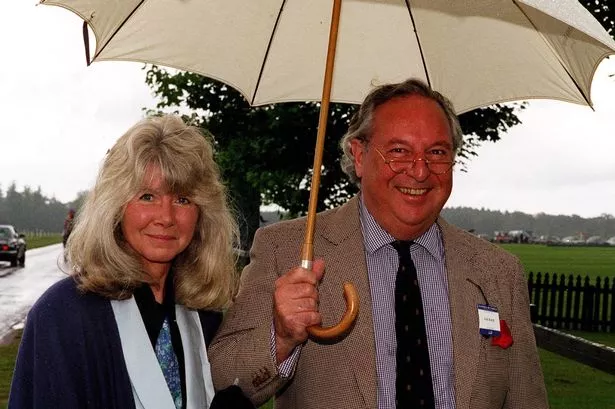Getty Images
Fans bought Cooper’s books in their millions, pushing many to the top of the bestseller lists
The novels of Dame Jilly Cooper, who has died at the age of 88, are joyous descriptions of a fantasy world where monied men cast smouldering glances and women are instantly aroused.
The undisputed queen of the British bonkbuster, some of her biggest titles were the Rutshire Chronicles: unputdownable tales of sexual intrigue among the polo-playing classes – including such classics as Rivals, Riders and The Man Who Made Husbands Jealous.
In Rutshire – Cooper’s fictional country – everyone drinks like they have hours to live, outdoor sex is practically compulsory, and few vows of marriage survive until the final page.
In recent years, her work was criticised for outdated stereotypes of race, gender and sexual consent. But fans bought Cooper’s books in their millions, pushing many to the top of the bestseller lists.
And in 2024, a Disney+ adaptation of Rivals, with its witty mixture of class-conflict, saucy sex and gentle social satire, proved that her basic recipe was still hugely popular.
Best-selling author Jilly Cooper dies at 88Latest tributes and reaction following Dame Jilly Cooper’s death’Shrewd and tough’: A look back at Jilly Cooper’s career
Jilly Sallitt was born on 21 February 1937 in Hornchurch, Essex, although her parents came from old established Yorkshire families.
Her father was Brigadier WB Sallitt OBE, a veteran of Dunkirk and surely a model for Cooper’s fictional male characters.
“I adored my very handsome father,” she said, “who got a first at Cambridge, and also played rugger for both Cambridge and the army.”
Her mother, Mary Sallitt was a noted beauty. Cooper, who described herself as “rather plump” as a teenager, worried about disappointing her.
Getty Images
Jilly Cooper said she spent far too much time “longing for boys” at school
The family returned to Yorkshire, where young Jilly was educated at the Moorfield School in Ilkley.
There she first met her future husband, Leo Cooper, when she was eight and he was three years older.
“My first memory of Leo,” she recalled, “was looking out of my bedroom window in Ilkley and seeing him throw a strawberry jelly at a girl who was rabbiting on about how much land her father had. I thought that terribly stylish.”
She went on to the all-girls Godolphin School in Salisbury where she excelled at English and little else. On her own admission, she spent far too much time “longing for boys”.
Her family moved to London in the mid-1950s and, having failed to get the qualifications necessary to go to university, she embarked on a career as a journalist.
She began working as a junior reporter on the Middlesex Independent, where she covered everything – including the local football team.
Getty Images
Jilly and Leo Cooper adopted two children: Felix and Emily
However, she was unable to settle.
She was sacked from 20 jobs, including stints in public relations and work as a copywriter – before finally working in publishing.
She met up again with “strong and handsome” Leo Cooper, then working as a publisher of military books.
On their first date, he “unpinned my hair and told me I must never put my hair up again. And then he asked me to marry him.”
Having experienced what reads like a scene from her own novels, Jilly did just that. She walked down the aisle with Leo in 1961.
Getty Images
Jilly Cooper photographed at home, surrounded by dogs
Unable to have children of their own, Jilly and Leo adopted Emily and Felix.
They set up home in Putney and struggled for money until 1968 – when Cooper got her big break.
Over dinner with a Sunday Times magazine editor, Godrey Smith, she entertained him with bawdy tales of life as a hard-drinking, sexually liberated housewife.
She was asked to write a piece for the newspaper, and the result had all the Jilly Cooper trademarks. It was totally outrageous, very funny and she was soon a regular contributor.
A year later, the column became a book: How to Stay Married – which was full of now dated advice, including such pearls of wisdom as “if you amuse a man in bed, he’s not likely to bother about the mountain of dust underneath it”.
In 1970, she wrote a follow-up: How to Survive from Nine to Five. Thereafter, Cooper averaged around a book a year.
Getty Images
Jilly Cooper published books about how to navigate the minefields of romance, before trying her hand a fiction
She also created a TV sitcom, It’s Awfully Bad For Your Eyes Darling. It starred Joanna Lumley and aired on the BBC in 1971.
During the 13 years she worked for the Sunday Times, she also did serious interviews with a number of high profile figures including Margaret Thatcher, George Best and Rebecca West.
And the 1970s saw her publish a flurry of books aimed at helping readers navigate the minefields of romance, including Men and Super Men, Woman and Superwomen, and Work & Wedlock.
Then in 1975, she began to dabble in fiction.
Her first novel was Emily – a romance based on a magazine article she’d written some years before.
A rich, handsome man sweeps the heroine off her feet and bears her away to his ancestral home on a Scottish island – where she has to cope with his eccentric mother and a mysterious former flame.
Flatteringly, Harpers & Queen magazine hailed Cooper as the “Jane Austen of our time” – although Pride and Prejudice has rather fewer descriptions of lusty sex in improbable places.
Getty Images
Jilly Cooper’s social circle included the future Queen Camilla
Emily was followed by a slew of page-turners in similar, breathy vein: Bella, Harriet, Imogen and Prudence.
Octavia, in which a gushing party girl falls instantly in love with a blond, sharp-cheeked beau called Jeremy, later became an ITV series.
In 1979, Cooper wrote Class: A View from Middle England: a cheerful examination of the intricacies of the system that both holds the country together, and simultaneously divides it.
Describing herself as “upper-middle class”, she tells a variety of real-life anecdotes – including the story of an imperious member of the House of Lords who, having just missed his train, commanded the station master to “get me another”.
Class was becoming a theme that permeated both her fiction and non-fiction. And Cooper’s social circle now included some very upper class people indeed.
Famously, these included Andrew and Camilla Parker-Bowles, who later – of course – became Queen.
“The first time I met her I wore a miniskirt and fishnet stockings,” Cooper recalled. “She looked me up and down and said, ‘Oh, Andrew had 35 Valentines’ this year.’ Keep off the grass.”
Getty Images
Leo and Jilly Cooper photographed in 2004
Over the ensuing five years, her output was prodigious.
There were more self-help books, including How to Survive Christmas, and The Common Years: a brilliantly observed look at the time when she lived by and walked on Putney Common.
Animals in War was a poignant account of dogs, horses and pigeons that have served and suffered in various conflicts.
In 1985, she published Riders: the first of the Rutshire Chronicles.
Cooper had left the original manuscript on a London bus, and it had taken her a decade to rewrite it – but it became an international bestseller.
Set amid the world of international showjumping, it introduced her hero: Rupert Campbell-Black – a brutish cad who treats women and horses cruelly, before mellowing slightly through the influence of his second wife, Taggie O’Hara.
Getty Images
Jilly Cooper became a Dame of the British Empire in 2024
Over the ensuing four decades, she published around a dozen Rutshire novels, including Rivals, Polo, Appassionata and Pandora.
The Man Who Made Husbands Jealous, about a womaniser who falls victim to a scheme to punish wayward husbands, later became an ITV miniseries starring Hugh Bonneville.
Jilly Cooper knew how to keep her reader hooked, weaving together a bewildering variety of characters and constantly switching the narrative.
Having spent a lifetime writing about infidelity, she then felt the sting of adultery.
In 1990, publisher Sarah Johnson told a newspaper that she and Leo had been having an affair for six years. The revelation was prompted, she said, by Jilly’s habit of boasting in print about her perfect marriage.
For a while, Jilly and Leo lived semi-separate lives. But, eventually, they reconciled.
Getty Images
Dame Jilly Cooper surrounded by members of the cast of Disney+’s adaptation of Rivals in 2024
In 1999, she narrowly escaped death in the Ladbroke Grove train crash.
With 31 deaths and more than 400 injured, it was one of the worst accidents in the history of British transport.
But, having crawled through a broken carriage window, Cooper calmly walked to the nearest street, hailed a taxi, and went to a pre-arranged meeting at the Ritz.
In 2004, Jilly Cooper was awarded an OBE. Twenty years later, Buckingham Palace was in touch again – asking her to become a Dame.
After Leo’s death from Parkinson’s disease, she faced life alone. But, fast approaching 90, she was still publishing.
In 2023, Tackle! – the latest installation of the Rutshire Chronicles – found Rupert Campbell-Black taking control of the local football team despite hating the sport.
While promoting the book, Dame Jilly lavished alcohol and peerless quotes on any journalist that ventured to her home in Gloucestershire.
A year later, Disney+’s glossy TV adaption of Rivals brought her a new generation of fans. Even the then Prime Minister Rishi Sunak admitted he counted himself amongst them.
Dame Jilly seemed to find as much fun in her books as her readers did. “They’re a bit of everything really,” she once said. “And happy endings too.”
She will be remembered as an irrepressible gossip, whose enormous sales caused some to overlook her enviable skills as a writer.





